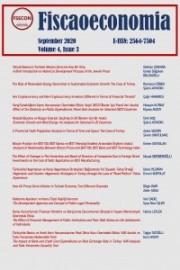Vergi Esnekliğinin Kamu Harcamaları Üzerindeki Etkisi: Seçili OECD Ülkeler İçin Panel Veri Analizi
Effect of Tax Elasticity on Public Expenditures: Panel Data Analysis for Selected OECD Countries
Author(s): Hüseyin Kutbay, Elyasa AksoySubject(s): Evaluation research, Public Finances, Fiscal Politics / Budgeting
Published by: Ahmet Arif Eren
Keywords: Tax Elasticity; Public Expenditure; GDP; Panel Data Analysis;
Summary/Abstract: In this study, the impact of tax elasticity on public expenditures was analyzed for 7 OECD countries (Canada, Iceland, Latvia, Lithuania, Luxembourg, Netherlands and Switzerland). The study based on panel data analysis method covers the years 1997- 2016. In this study, public expenditures is used as dependent variable and tax flexibility, consumer price index and population growth rate are used as independent variables. In order to determine the model to be used firstly, the Breusch-Pagan Lagrange Multiplier test was used to test which of the random effects model and the OLS model would be more appropriate, and the results show that the random effects model is more suitable. A Hausman test was conducted to determine the model that is more suitable between the fixed effects model and the random effects model, and the test statistics obtained are ultimately shows that the random effects model is appropriate. In order to identify the problems that may be included in the model based on the random effects model; The Balbingi and Li (1991), Born and Breitung (2016) and Bhargava, Franzini and Narendranathan (1982) Durbin-Watson autocorrelation tests and Levene, Brown and Forsythe (1974) heteroscedasticity tests were performed. In addition, the cross-sectional dependency of the model was performed with Pesaran (2004) test. The relationship between the series was estimated by Driscroll and Kraay (1998) standard errors, since both auto-correlation and heteroscedasticity and the presence of cross-sectional dependence were detected. As a result of the estimations made, it has been determined that tax flexibility and population growth rate affect (increase) positively, and the consumer price index negatively affects (decreases) public expenditures.
Journal: Fiscaoeconomia
- Issue Year: 4/2020
- Issue No: 3
- Page Range: 580-594
- Page Count: 15
- Language: Turkish

